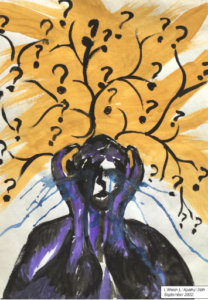Author: Lorraine Welch
 And yet I find myself feeling pressured and responsible to do this, both professionally and personally. Its October 2022 and black history month again. The theme this year is Time for change: Action not words. Resultantly I find myself writing and publishing blogs and articles like this one. I am part of both the special interest groups and the official committee for my professional body; concerning Equality and Diversity. I have become a ‘Diversity Champion’ at my NHS workplace. It’s all quite a lot to take on, on top of my normal work as a full-time therapist and being in the world (with the state that it’s in) as a woman of colour.
And yet I find myself feeling pressured and responsible to do this, both professionally and personally. Its October 2022 and black history month again. The theme this year is Time for change: Action not words. Resultantly I find myself writing and publishing blogs and articles like this one. I am part of both the special interest groups and the official committee for my professional body; concerning Equality and Diversity. I have become a ‘Diversity Champion’ at my NHS workplace. It’s all quite a lot to take on, on top of my normal work as a full-time therapist and being in the world (with the state that it’s in) as a woman of colour.
There are many personal and contextual reasons why I’m uncomfortable with it. I’m naturally an introvert and prone to feeling judged and self-conscious. I’m not blessed with skills as an orator or for inspiring or commanding people’s attention. I don’t have any special skills, knowledge, status or power which qualify me for these roles, and it often takes me a while to figure out my place, what I can do and find my voice. I don’t know what it’s like to be in the world as someone from a different country, or of a different culture, religion, sexuality, gender identity, class or social context to my own intersectional identity. So, I am aware that my own experiences, biases and prejudices will impact my desire to also advocate for those of colour or otherwise who are different to me.
I am painfully aware of my privilege as an able-bodied, heterosexual, British-born, educated, lighter skinned woman; of dual heritage (Philippine and Barbadian) with a British sounding accent and name. Although I suspect these characteristics often shield me from an icier reception to my perspectives than could be the case otherwise, I’m rather aware they invite my ‘fawning’ (rather than the fight, flight or freeze) response to the threat of enactments of othering or racial trauma I witness or face.
My unhelpful ‘fawning’ response is a survival mechanism which stems from the opposing experiences of wanting and naively expecting to be heard and accepted by the white majority I grew up and navigate around; yet often finding it difficult to square that inequality and racist or discriminatory systems continue to affect me and others. This leaves me feeling scared and doubtful that my and other people of colour’s feelings, experiences and views are seen as valid, (even by me).
This experience of being aware of multiple simultaneous states in a moment is an experience named ‘shimmering’ in the sphere of Cognitive Analytic Therapy. Or perhaps it is like what we call ‘cognitive dissonance’ in psychological fields.
I have noticed when I feel or am witness to others of colour, being particularly weighed down, blocked from opportunities, dismissed, tokenised, silenced, or even harmed while trying to get on with life, pick a battle to fight or succeed; I can quietly slip into a gradual, yet deafening state of ‘gaslit’ apathy. It is a hopeless, helpless disempowered state of inaction, brought about by just how exhausting, yet boring and familiar it all feels.
In this state I feel ‘stupid’ for thinking I could have made a difference or that injustices can be challenged. Here, I can’t benefit from the activation of anger, so I accept I need to take some time to grieve and recuperate, until I can recognise what has happened internally and try to move forward.
So why do I still try to do it? Again, there are personal and professional reasons. I grew up with a Windrush generation parent who was so much disturbed by a state of apathetic helplessness and disempowerment, in response to the violent, Enoch Powell brand of racism they faced in the 60s; that it was diagnosed as psychosis.
I was taught it was not safe to draw attention to, to fight, to vote, to speak-up for or ask questions or complain. I was taught to accept, strive twice as hard and get on with. This way of being was reinforced when I became a mental health nurse subject to the hierarchy in psychiatry, that often left me uncomfortable with how ‘the system’ both invited dependence from its service users, and perpetuated iatrogenic traumas rooted in the inequalities and differences between people.
But as a therapist I have discovered it is possible to listen and learn from others with abilities to lead and be part of systems to understand how they operate. Finding allies and being encouraged to use my voice, I discovered I could gently or more forcefully when needed, push where it moved and encourage my clients of all intersections to do the same for themselves and others, and to rest when I or they need to.
I discovered doing so could result in the small victories; that I have to remind myself are still progress. In the broader scheme of things, in 2022 in the UK; the fact is that there is still so much more we need to do to not endanger and to actively protect and value black and brown lives.
So, I appeal to the genuine allies and potential protagonists of equality who may be reading this, to consider the personal, emotional, contextual, historic and practical reasons why people of colour can’t take on responsibility alone to advocate for and be the spokesperson for change. I encourage you to use your platforms, skills, ideas, power, statuses and access to opportunities to encourage and help and support people of colour and their communities to do this.
Lorraine Welch: Cognitive Analytic Therapist

This speaks to me deeply and not only do I see some of my own experience here, but my client work is reflected as well. Thank you for your vulnerability and honest in this conversation that very much needs to be had.
Dear Karmela thank you for your comments, I am glad it resonated for you though of course it is always bittersweet to feel these feelings and experiences are shared.
A very genuine article, highlighting how our histories shape our personalities. It’s great to hear your honest inner voice which is very powerful. Inspiring. Well done.
Nice post. I was checking continuously this blog and I’m impressed!
Very helpful information specially the last part :
) I care for such info much. I was looking for this certain info for a long time.
Thank you and best of luck.